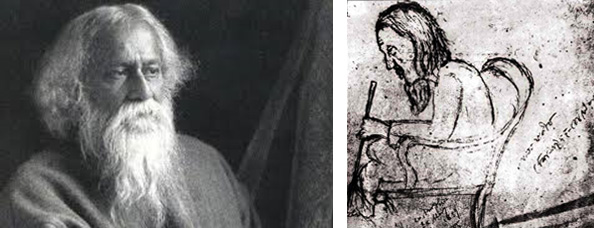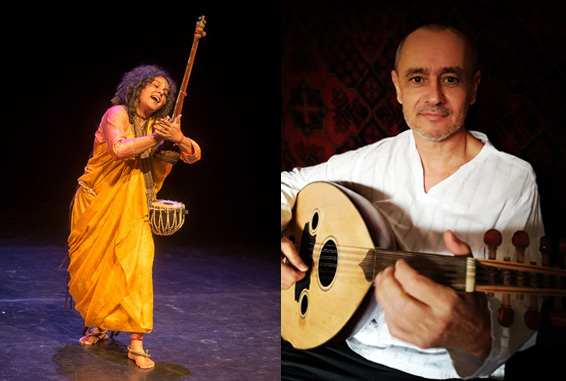Song Offerings (Gitanjali) - Tagore and Lalan
The concert of Parvathy Baul and Béla Wittek - 27 April, Saturday, 18:30, Kaszás Attila Stage
„Ever in my life have I sought thee with my songs. It was they who led me from door to door, and with them have I felt about me, searching and touching my world. It was my songs that taught me all the lessons I ever learnt; they showed me secret paths, they brought before my sight many a star on the horizon of my heart. They guided me all the day long to the mysteries of the country of pleasure and pain, and, at last, to what palace gate have the brought me in the evening at the end of my journey?”
Although, Rabindranath Tagore was celebrated in Hungary as a poet – translated by such famous Hungarian poets as Mihály Babits – only few know that he was also a prolific composer. His about 2230 songs, named Rabindra Sangeet, with their distinctive characteristics are quite popular in India, especially in West Bengal and Bangladesh. In our concert the public can listen the songs from different Tagore’s opus : Gitanjali, Giticharcha, Gitponchashika, Robicchaya.
Tagore’s poetry was deeply affected by the Baul songs of his home land.
Baul is mainly an oral tradition – intrinsically connected to the practice of Yogis, Sufis and Mystics – which serves to living wisdom of speaking songs of great saints. It has been practiced and performed through generations since thousands of years, and continues even today. This living tradition of Musical Mystic Practice is evolving everyday through the contributions of contemporary Baul Sadhakas (Baul practitioners) of Bengal. Her mission is the purpose of remembering, recognizing the flower of universal love which blossoms in everyone’s heart, devoid of caste, class or religion or any kind of human made boundaries.

Lalan (1772(?) – 17th October 1890) was one of the most influential Baul singers, called saint, fakir, sahn or mahatma as well. He was a social reformer and thinker, he wrote songs, and became an iconic figure of Bengali culture. Lalan sang about a world, where every religion and belief lived in harmony with each other. The last period of his life, he spent on the Tagore family’s estate, where the ink drawing (above) was made by Jyotirindranath, the brother of Rabindranath. This is the most credible memory of Lalan. The number of his songs is estimated between about 2000 and 10000, but only 800 is verified as surely originating from him. The songs were not written down by him; rather his apprentices orally passed them on or noted them down. Rabindranath Tagore was the first to publish some of them.
Parvathy Baul is a Baul and folk singer, painter and storyteller from West Bengal, and one of the leading Baul musicians in India. Her musical and dance education started in early age, after which she studied visual arts at the Kala Bhavan University, founded by Tagore in Santiniketan. There she first heard the concert of her latter master, Sanatan das Baul, who influenced her greatly in becoming a practitioner of the thousand years of Baul tradition. Since 1995, she has been performing in her home land, Bengal and throughout India. Parvathy is well known for her masterful solo rendering in the oldest style of Baul song and dance. She sings and dances with the minimal use of Baul instruments like Duggie, Ektara and Nupur, all played at the same time.
As an artist, she was invited to several international festivals: Festival de l’Imaginaire (Paris), Festival international du Conte et du Monodrame (Beirut, Lebanon), Ethnomad (Geneva, Switzerland). She performed worldwide in renowned venues, such as the Noh Theatre in Kyoto, where she collaborated with Japanese performers of Kamigata-mai and Kyogen dance traditions; the World Music Centre in New York; the Chicago University; and the theatre of Peter Schumann (Bread and Puppet Theatre, Vermont). Her Baul songs, prints and video-documents can be found in the South Asian collection of the Tropenmuseum in Amsterdam. In 2018, she received one of the most important Indian artistic awards (Sangeet Natak Akademi Award).

Béla Wittek graduated as a classical guitar player, from the Liszt Ferenc Music Academy in Budapest, 1987. From 1994, he was taught classical Indian music and playing the sitar by András Kozma, the former pupil of Ravi Shankar. In 2000, he founded the band called Talea, of which repertoire consists of arrangements of middle age and renaissance tunes, 16-17th century court music from Transylvania and Upper Hungary as well as Hungarian folk music. He gave concerts of classical and own compositions also in Switzerland, Austria, Slovenia, Croatia, Poland and Romania. In collaboration with György Erdélyi, their musical record containing poems of János Pilinszky, titled “Fokról-fokra” (Degree to Degree), was published by Fonó Records in 1999. Béla Wittek’s main field of interest is the interconnection of poetry and music. In the last 20 years, he composed music for many theatrical pieces too: Béla Balázs: Tündér (Fairy); Ágnes Nemes Nagy: Ház a hegyoldalon (House on the Hillside); Sergi Belbel: Mobil; Világszépnádszálkisasszony (The Beautiful Miss Reed); Ernő Verebes: Gerendák (Beams).
Béla Wittek has learnt to play several other instruments in an autodidact way. For the present concert he composed musical accompaniments of Tagore and Lalan’s songs, which he plays on úd (Arabic lute).
(03 April 2019)

